Report: Citizenship and Globalization - Estonian Nationality Framework
VerifiedAdded on 2023/01/19
|8
|2447
|55
Report
AI Summary
This report provides a comprehensive analysis of Estonian nationality within the context of globalization. It examines the attainment of nationality, focusing on the interplay between Jus Soli and Jus Sanguinis, and details Estonia's naturalization policy. The report explores the impact of globalization on citizenship, including the emergence of trans-national organizations and the importance of oath-taking. It discusses the historical background of Estonian citizenship, including its relationship with the Russian minority and the evolution of naturalization policies. The report also highlights the rights and duties of Estonian citizens, including voting rights and access to diplomatic protection, while addressing the concept of dual citizenship and the integration of minorities. Furthermore, it explores the development of the Estonian welfare state and its influence on citizenship, emphasizing the liberal model and the role of citizenship education in shaping civic values. The report concludes by summarizing the key aspects of Estonian citizenship, emphasizing the legal framework and the importance of fostering citizenship norms.
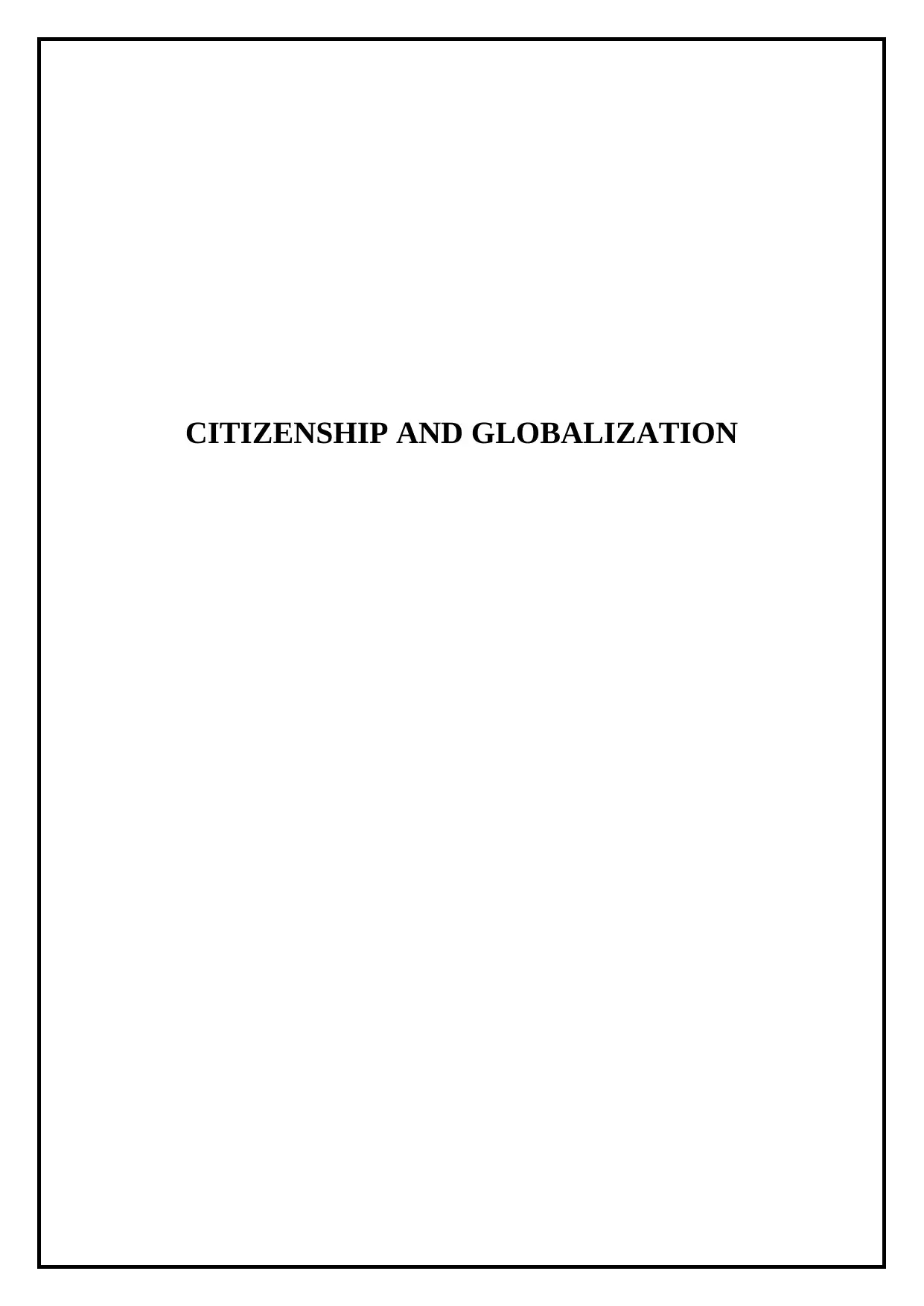
CITIZENSHIP AND GLOBALIZATION
Paraphrase This Document
Need a fresh take? Get an instant paraphrase of this document with our AI Paraphraser
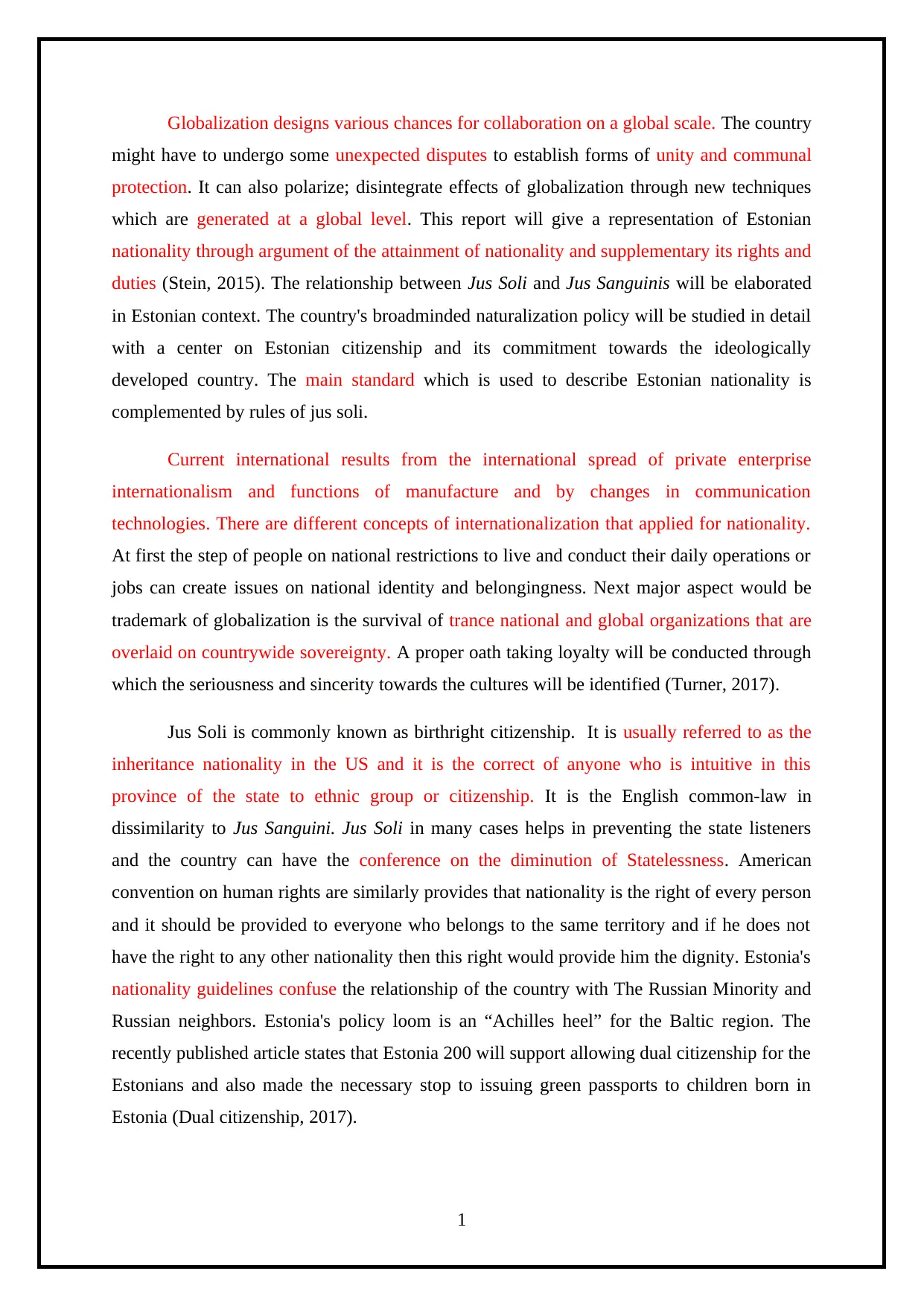
Globalization designs various chances for collaboration on a global scale. The country
might have to undergo some unexpected disputes to establish forms of unity and communal
protection. It can also polarize; disintegrate effects of globalization through new techniques
which are generated at a global level. This report will give a representation of Estonian
nationality through argument of the attainment of nationality and supplementary its rights and
duties (Stein, 2015). The relationship between Jus Soli and Jus Sanguinis will be elaborated
in Estonian context. The country's broadminded naturalization policy will be studied in detail
with a center on Estonian citizenship and its commitment towards the ideologically
developed country. The main standard which is used to describe Estonian nationality is
complemented by rules of jus soli.
Current international results from the international spread of private enterprise
internationalism and functions of manufacture and by changes in communication
technologies. There are different concepts of internationalization that applied for nationality.
At first the step of people on national restrictions to live and conduct their daily operations or
jobs can create issues on national identity and belongingness. Next major aspect would be
trademark of globalization is the survival of trance national and global organizations that are
overlaid on countrywide sovereignty. A proper oath taking loyalty will be conducted through
which the seriousness and sincerity towards the cultures will be identified (Turner, 2017).
Jus Soli is commonly known as birthright citizenship. It is usually referred to as the
inheritance nationality in the US and it is the correct of anyone who is intuitive in this
province of the state to ethnic group or citizenship. It is the English common-law in
dissimilarity to Jus Sanguini. Jus Soli in many cases helps in preventing the state listeners
and the country can have the conference on the diminution of Statelessness. American
convention on human rights are similarly provides that nationality is the right of every person
and it should be provided to everyone who belongs to the same territory and if he does not
have the right to any other nationality then this right would provide him the dignity. Estonia's
nationality guidelines confuse the relationship of the country with The Russian Minority and
Russian neighbors. Estonia's policy loom is an “Achilles heel” for the Baltic region. The
recently published article states that Estonia 200 will support allowing dual citizenship for the
Estonians and also made the necessary stop to issuing green passports to children born in
Estonia (Dual citizenship, 2017).
1
might have to undergo some unexpected disputes to establish forms of unity and communal
protection. It can also polarize; disintegrate effects of globalization through new techniques
which are generated at a global level. This report will give a representation of Estonian
nationality through argument of the attainment of nationality and supplementary its rights and
duties (Stein, 2015). The relationship between Jus Soli and Jus Sanguinis will be elaborated
in Estonian context. The country's broadminded naturalization policy will be studied in detail
with a center on Estonian citizenship and its commitment towards the ideologically
developed country. The main standard which is used to describe Estonian nationality is
complemented by rules of jus soli.
Current international results from the international spread of private enterprise
internationalism and functions of manufacture and by changes in communication
technologies. There are different concepts of internationalization that applied for nationality.
At first the step of people on national restrictions to live and conduct their daily operations or
jobs can create issues on national identity and belongingness. Next major aspect would be
trademark of globalization is the survival of trance national and global organizations that are
overlaid on countrywide sovereignty. A proper oath taking loyalty will be conducted through
which the seriousness and sincerity towards the cultures will be identified (Turner, 2017).
Jus Soli is commonly known as birthright citizenship. It is usually referred to as the
inheritance nationality in the US and it is the correct of anyone who is intuitive in this
province of the state to ethnic group or citizenship. It is the English common-law in
dissimilarity to Jus Sanguini. Jus Soli in many cases helps in preventing the state listeners
and the country can have the conference on the diminution of Statelessness. American
convention on human rights are similarly provides that nationality is the right of every person
and it should be provided to everyone who belongs to the same territory and if he does not
have the right to any other nationality then this right would provide him the dignity. Estonia's
nationality guidelines confuse the relationship of the country with The Russian Minority and
Russian neighbors. Estonia's policy loom is an “Achilles heel” for the Baltic region. The
recently published article states that Estonia 200 will support allowing dual citizenship for the
Estonians and also made the necessary stop to issuing green passports to children born in
Estonia (Dual citizenship, 2017).
1
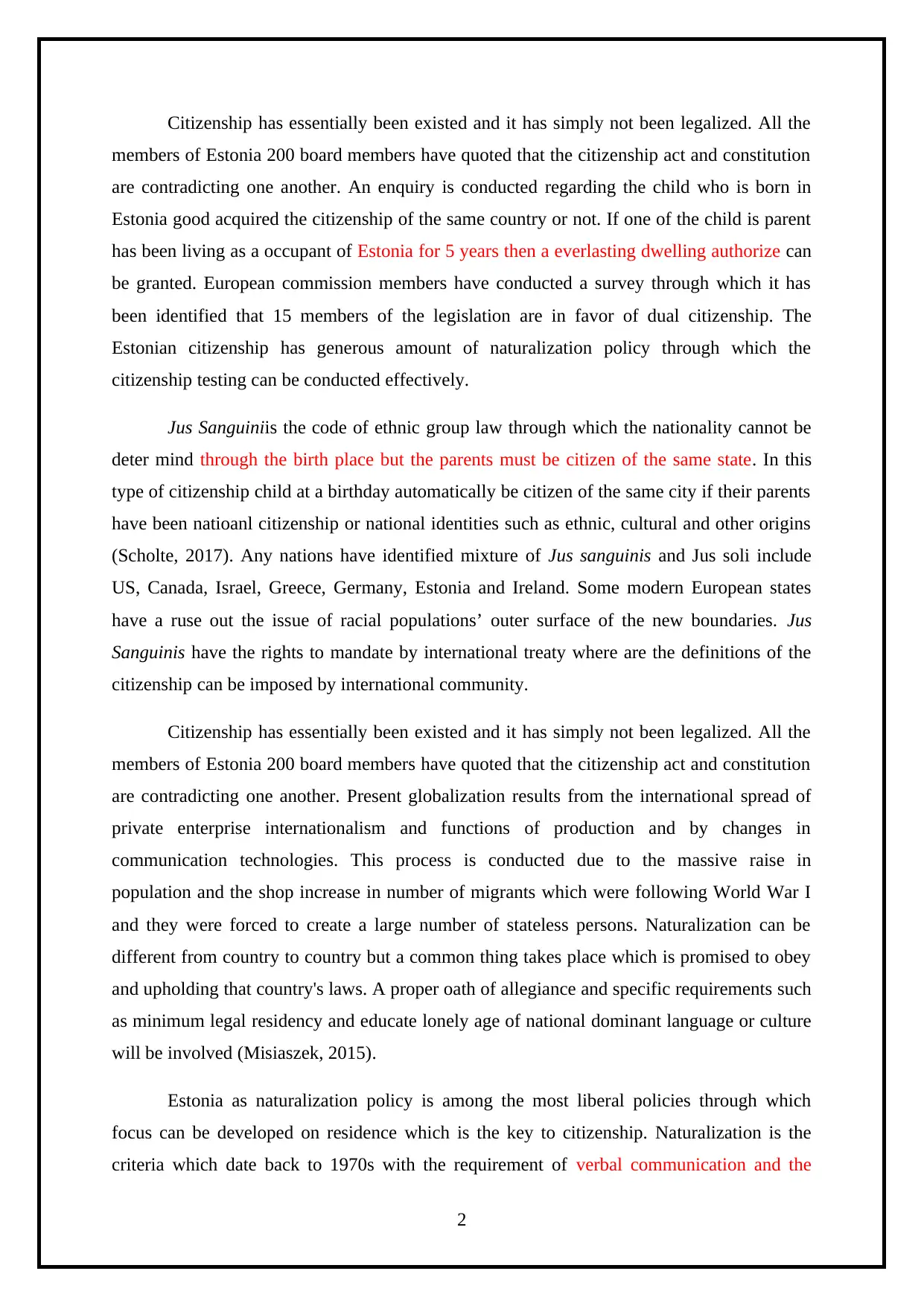
Citizenship has essentially been existed and it has simply not been legalized. All the
members of Estonia 200 board members have quoted that the citizenship act and constitution
are contradicting one another. An enquiry is conducted regarding the child who is born in
Estonia good acquired the citizenship of the same country or not. If one of the child is parent
has been living as a occupant of Estonia for 5 years then a everlasting dwelling authorize can
be granted. European commission members have conducted a survey through which it has
been identified that 15 members of the legislation are in favor of dual citizenship. The
Estonian citizenship has generous amount of naturalization policy through which the
citizenship testing can be conducted effectively.
Jus Sanguiniis the code of ethnic group law through which the nationality cannot be
deter mind through the birth place but the parents must be citizen of the same state. In this
type of citizenship child at a birthday automatically be citizen of the same city if their parents
have been natioanl citizenship or national identities such as ethnic, cultural and other origins
(Scholte, 2017). Any nations have identified mixture of Jus sanguinis and Jus soli include
US, Canada, Israel, Greece, Germany, Estonia and Ireland. Some modern European states
have a ruse out the issue of racial populations’ outer surface of the new boundaries. Jus
Sanguinis have the rights to mandate by international treaty where are the definitions of the
citizenship can be imposed by international community.
Citizenship has essentially been existed and it has simply not been legalized. All the
members of Estonia 200 board members have quoted that the citizenship act and constitution
are contradicting one another. Present globalization results from the international spread of
private enterprise internationalism and functions of production and by changes in
communication technologies. This process is conducted due to the massive raise in
population and the shop increase in number of migrants which were following World War I
and they were forced to create a large number of stateless persons. Naturalization can be
different from country to country but a common thing takes place which is promised to obey
and upholding that country's laws. A proper oath of allegiance and specific requirements such
as minimum legal residency and educate lonely age of national dominant language or culture
will be involved (Misiaszek, 2015).
Estonia as naturalization policy is among the most liberal policies through which
focus can be developed on residence which is the key to citizenship. Naturalization is the
criteria which date back to 1970s with the requirement of verbal communication and the
2
members of Estonia 200 board members have quoted that the citizenship act and constitution
are contradicting one another. An enquiry is conducted regarding the child who is born in
Estonia good acquired the citizenship of the same country or not. If one of the child is parent
has been living as a occupant of Estonia for 5 years then a everlasting dwelling authorize can
be granted. European commission members have conducted a survey through which it has
been identified that 15 members of the legislation are in favor of dual citizenship. The
Estonian citizenship has generous amount of naturalization policy through which the
citizenship testing can be conducted effectively.
Jus Sanguiniis the code of ethnic group law through which the nationality cannot be
deter mind through the birth place but the parents must be citizen of the same state. In this
type of citizenship child at a birthday automatically be citizen of the same city if their parents
have been natioanl citizenship or national identities such as ethnic, cultural and other origins
(Scholte, 2017). Any nations have identified mixture of Jus sanguinis and Jus soli include
US, Canada, Israel, Greece, Germany, Estonia and Ireland. Some modern European states
have a ruse out the issue of racial populations’ outer surface of the new boundaries. Jus
Sanguinis have the rights to mandate by international treaty where are the definitions of the
citizenship can be imposed by international community.
Citizenship has essentially been existed and it has simply not been legalized. All the
members of Estonia 200 board members have quoted that the citizenship act and constitution
are contradicting one another. Present globalization results from the international spread of
private enterprise internationalism and functions of production and by changes in
communication technologies. This process is conducted due to the massive raise in
population and the shop increase in number of migrants which were following World War I
and they were forced to create a large number of stateless persons. Naturalization can be
different from country to country but a common thing takes place which is promised to obey
and upholding that country's laws. A proper oath of allegiance and specific requirements such
as minimum legal residency and educate lonely age of national dominant language or culture
will be involved (Misiaszek, 2015).
Estonia as naturalization policy is among the most liberal policies through which
focus can be developed on residence which is the key to citizenship. Naturalization is the
criteria which date back to 1970s with the requirement of verbal communication and the
2
⊘ This is a preview!⊘
Do you want full access?
Subscribe today to unlock all pages.

Trusted by 1+ million students worldwide
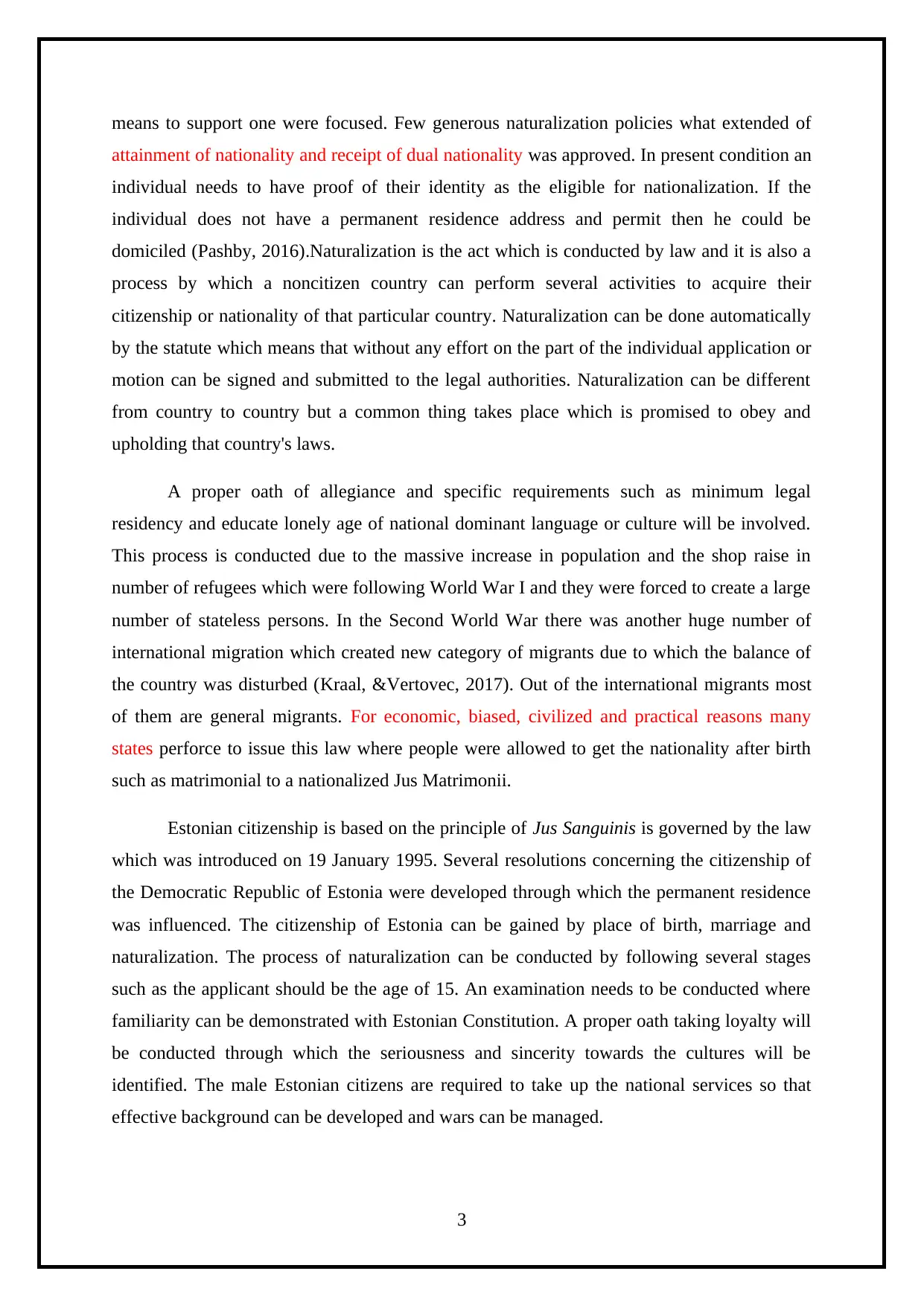
means to support one were focused. Few generous naturalization policies what extended of
attainment of nationality and receipt of dual nationality was approved. In present condition an
individual needs to have proof of their identity as the eligible for nationalization. If the
individual does not have a permanent residence address and permit then he could be
domiciled (Pashby, 2016).Naturalization is the act which is conducted by law and it is also a
process by which a noncitizen country can perform several activities to acquire their
citizenship or nationality of that particular country. Naturalization can be done automatically
by the statute which means that without any effort on the part of the individual application or
motion can be signed and submitted to the legal authorities. Naturalization can be different
from country to country but a common thing takes place which is promised to obey and
upholding that country's laws.
A proper oath of allegiance and specific requirements such as minimum legal
residency and educate lonely age of national dominant language or culture will be involved.
This process is conducted due to the massive increase in population and the shop raise in
number of refugees which were following World War I and they were forced to create a large
number of stateless persons. In the Second World War there was another huge number of
international migration which created new category of migrants due to which the balance of
the country was disturbed (Kraal, &Vertovec, 2017). Out of the international migrants most
of them are general migrants. For economic, biased, civilized and practical reasons many
states perforce to issue this law where people were allowed to get the nationality after birth
such as matrimonial to a nationalized Jus Matrimonii.
Estonian citizenship is based on the principle of Jus Sanguinis is governed by the law
which was introduced on 19 January 1995. Several resolutions concerning the citizenship of
the Democratic Republic of Estonia were developed through which the permanent residence
was influenced. The citizenship of Estonia can be gained by place of birth, marriage and
naturalization. The process of naturalization can be conducted by following several stages
such as the applicant should be the age of 15. An examination needs to be conducted where
familiarity can be demonstrated with Estonian Constitution. A proper oath taking loyalty will
be conducted through which the seriousness and sincerity towards the cultures will be
identified. The male Estonian citizens are required to take up the national services so that
effective background can be developed and wars can be managed.
3
attainment of nationality and receipt of dual nationality was approved. In present condition an
individual needs to have proof of their identity as the eligible for nationalization. If the
individual does not have a permanent residence address and permit then he could be
domiciled (Pashby, 2016).Naturalization is the act which is conducted by law and it is also a
process by which a noncitizen country can perform several activities to acquire their
citizenship or nationality of that particular country. Naturalization can be done automatically
by the statute which means that without any effort on the part of the individual application or
motion can be signed and submitted to the legal authorities. Naturalization can be different
from country to country but a common thing takes place which is promised to obey and
upholding that country's laws.
A proper oath of allegiance and specific requirements such as minimum legal
residency and educate lonely age of national dominant language or culture will be involved.
This process is conducted due to the massive increase in population and the shop raise in
number of refugees which were following World War I and they were forced to create a large
number of stateless persons. In the Second World War there was another huge number of
international migration which created new category of migrants due to which the balance of
the country was disturbed (Kraal, &Vertovec, 2017). Out of the international migrants most
of them are general migrants. For economic, biased, civilized and practical reasons many
states perforce to issue this law where people were allowed to get the nationality after birth
such as matrimonial to a nationalized Jus Matrimonii.
Estonian citizenship is based on the principle of Jus Sanguinis is governed by the law
which was introduced on 19 January 1995. Several resolutions concerning the citizenship of
the Democratic Republic of Estonia were developed through which the permanent residence
was influenced. The citizenship of Estonia can be gained by place of birth, marriage and
naturalization. The process of naturalization can be conducted by following several stages
such as the applicant should be the age of 15. An examination needs to be conducted where
familiarity can be demonstrated with Estonian Constitution. A proper oath taking loyalty will
be conducted through which the seriousness and sincerity towards the cultures will be
identified. The male Estonian citizens are required to take up the national services so that
effective background can be developed and wars can be managed.
3
Paraphrase This Document
Need a fresh take? Get an instant paraphrase of this document with our AI Paraphraser
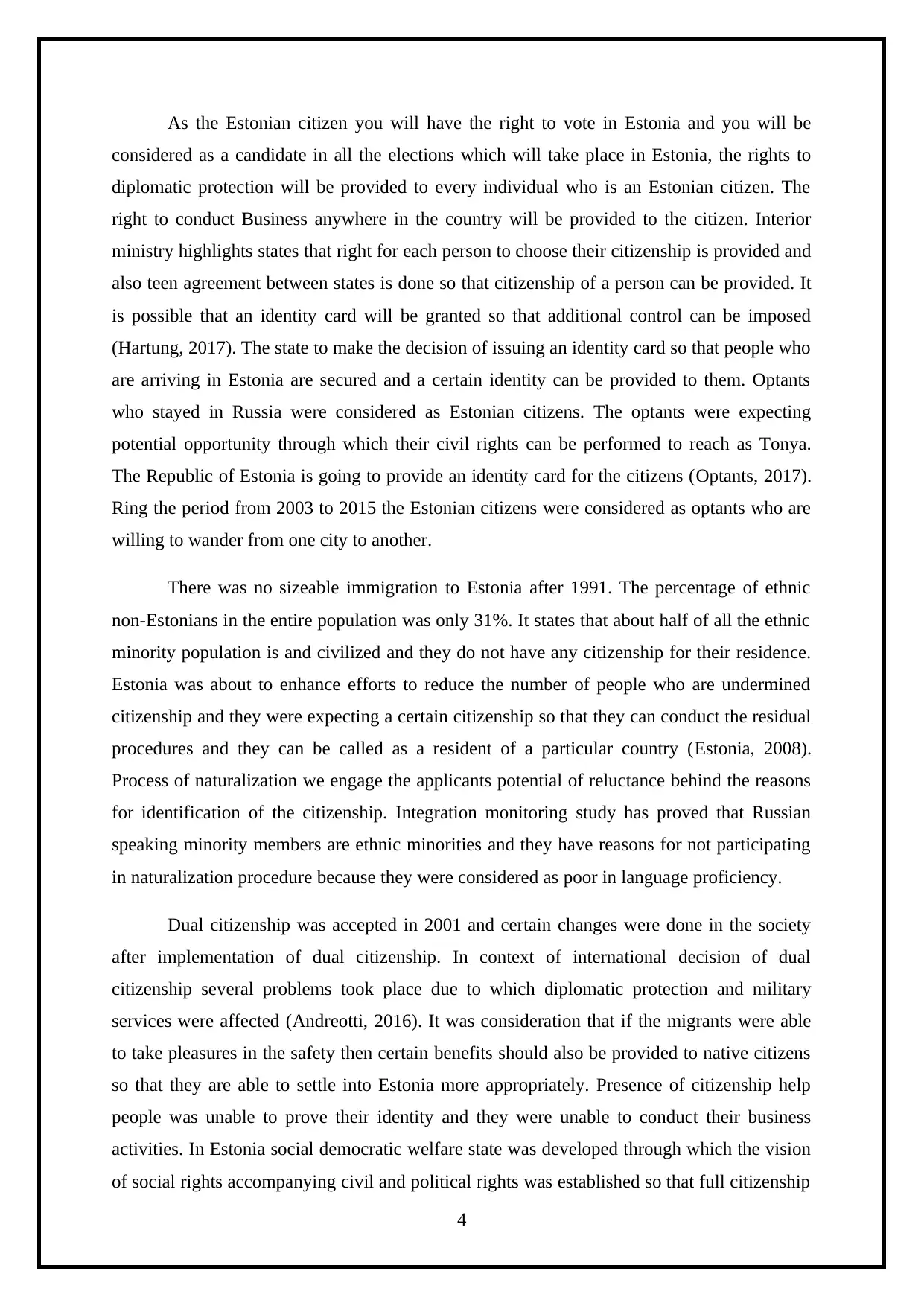
As the Estonian citizen you will have the right to vote in Estonia and you will be
considered as a candidate in all the elections which will take place in Estonia, the rights to
diplomatic protection will be provided to every individual who is an Estonian citizen. The
right to conduct Business anywhere in the country will be provided to the citizen. Interior
ministry highlights states that right for each person to choose their citizenship is provided and
also teen agreement between states is done so that citizenship of a person can be provided. It
is possible that an identity card will be granted so that additional control can be imposed
(Hartung, 2017). The state to make the decision of issuing an identity card so that people who
are arriving in Estonia are secured and a certain identity can be provided to them. Optants
who stayed in Russia were considered as Estonian citizens. The optants were expecting
potential opportunity through which their civil rights can be performed to reach as Tonya.
The Republic of Estonia is going to provide an identity card for the citizens (Optants, 2017).
Ring the period from 2003 to 2015 the Estonian citizens were considered as optants who are
willing to wander from one city to another.
There was no sizeable immigration to Estonia after 1991. The percentage of ethnic
non-Estonians in the entire population was only 31%. It states that about half of all the ethnic
minority population is and civilized and they do not have any citizenship for their residence.
Estonia was about to enhance efforts to reduce the number of people who are undermined
citizenship and they were expecting a certain citizenship so that they can conduct the residual
procedures and they can be called as a resident of a particular country (Estonia, 2008).
Process of naturalization we engage the applicants potential of reluctance behind the reasons
for identification of the citizenship. Integration monitoring study has proved that Russian
speaking minority members are ethnic minorities and they have reasons for not participating
in naturalization procedure because they were considered as poor in language proficiency.
Dual citizenship was accepted in 2001 and certain changes were done in the society
after implementation of dual citizenship. In context of international decision of dual
citizenship several problems took place due to which diplomatic protection and military
services were affected (Andreotti, 2016). It was consideration that if the migrants were able
to take pleasures in the safety then certain benefits should also be provided to native citizens
so that they are able to settle into Estonia more appropriately. Presence of citizenship help
people was unable to prove their identity and they were unable to conduct their business
activities. In Estonia social democratic welfare state was developed through which the vision
of social rights accompanying civil and political rights was established so that full citizenship
4
considered as a candidate in all the elections which will take place in Estonia, the rights to
diplomatic protection will be provided to every individual who is an Estonian citizen. The
right to conduct Business anywhere in the country will be provided to the citizen. Interior
ministry highlights states that right for each person to choose their citizenship is provided and
also teen agreement between states is done so that citizenship of a person can be provided. It
is possible that an identity card will be granted so that additional control can be imposed
(Hartung, 2017). The state to make the decision of issuing an identity card so that people who
are arriving in Estonia are secured and a certain identity can be provided to them. Optants
who stayed in Russia were considered as Estonian citizens. The optants were expecting
potential opportunity through which their civil rights can be performed to reach as Tonya.
The Republic of Estonia is going to provide an identity card for the citizens (Optants, 2017).
Ring the period from 2003 to 2015 the Estonian citizens were considered as optants who are
willing to wander from one city to another.
There was no sizeable immigration to Estonia after 1991. The percentage of ethnic
non-Estonians in the entire population was only 31%. It states that about half of all the ethnic
minority population is and civilized and they do not have any citizenship for their residence.
Estonia was about to enhance efforts to reduce the number of people who are undermined
citizenship and they were expecting a certain citizenship so that they can conduct the residual
procedures and they can be called as a resident of a particular country (Estonia, 2008).
Process of naturalization we engage the applicants potential of reluctance behind the reasons
for identification of the citizenship. Integration monitoring study has proved that Russian
speaking minority members are ethnic minorities and they have reasons for not participating
in naturalization procedure because they were considered as poor in language proficiency.
Dual citizenship was accepted in 2001 and certain changes were done in the society
after implementation of dual citizenship. In context of international decision of dual
citizenship several problems took place due to which diplomatic protection and military
services were affected (Andreotti, 2016). It was consideration that if the migrants were able
to take pleasures in the safety then certain benefits should also be provided to native citizens
so that they are able to settle into Estonia more appropriately. Presence of citizenship help
people was unable to prove their identity and they were unable to conduct their business
activities. In Estonia social democratic welfare state was developed through which the vision
of social rights accompanying civil and political rights was established so that full citizenship
4
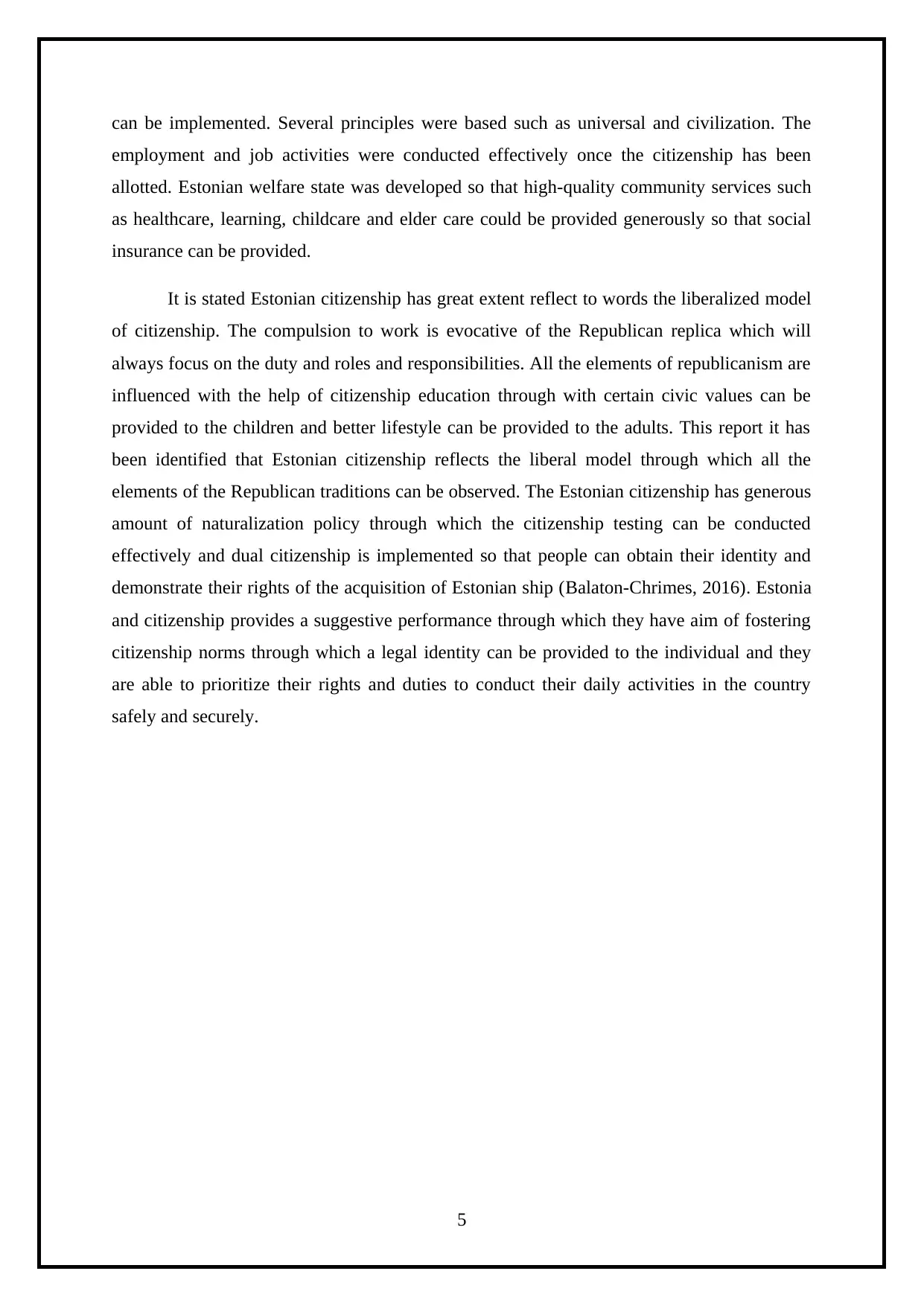
can be implemented. Several principles were based such as universal and civilization. The
employment and job activities were conducted effectively once the citizenship has been
allotted. Estonian welfare state was developed so that high-quality community services such
as healthcare, learning, childcare and elder care could be provided generously so that social
insurance can be provided.
It is stated Estonian citizenship has great extent reflect to words the liberalized model
of citizenship. The compulsion to work is evocative of the Republican replica which will
always focus on the duty and roles and responsibilities. All the elements of republicanism are
influenced with the help of citizenship education through with certain civic values can be
provided to the children and better lifestyle can be provided to the adults. This report it has
been identified that Estonian citizenship reflects the liberal model through which all the
elements of the Republican traditions can be observed. The Estonian citizenship has generous
amount of naturalization policy through which the citizenship testing can be conducted
effectively and dual citizenship is implemented so that people can obtain their identity and
demonstrate their rights of the acquisition of Estonian ship (Balaton-Chrimes, 2016). Estonia
and citizenship provides a suggestive performance through which they have aim of fostering
citizenship norms through which a legal identity can be provided to the individual and they
are able to prioritize their rights and duties to conduct their daily activities in the country
safely and securely.
5
employment and job activities were conducted effectively once the citizenship has been
allotted. Estonian welfare state was developed so that high-quality community services such
as healthcare, learning, childcare and elder care could be provided generously so that social
insurance can be provided.
It is stated Estonian citizenship has great extent reflect to words the liberalized model
of citizenship. The compulsion to work is evocative of the Republican replica which will
always focus on the duty and roles and responsibilities. All the elements of republicanism are
influenced with the help of citizenship education through with certain civic values can be
provided to the children and better lifestyle can be provided to the adults. This report it has
been identified that Estonian citizenship reflects the liberal model through which all the
elements of the Republican traditions can be observed. The Estonian citizenship has generous
amount of naturalization policy through which the citizenship testing can be conducted
effectively and dual citizenship is implemented so that people can obtain their identity and
demonstrate their rights of the acquisition of Estonian ship (Balaton-Chrimes, 2016). Estonia
and citizenship provides a suggestive performance through which they have aim of fostering
citizenship norms through which a legal identity can be provided to the individual and they
are able to prioritize their rights and duties to conduct their daily activities in the country
safely and securely.
5
⊘ This is a preview!⊘
Do you want full access?
Subscribe today to unlock all pages.

Trusted by 1+ million students worldwide
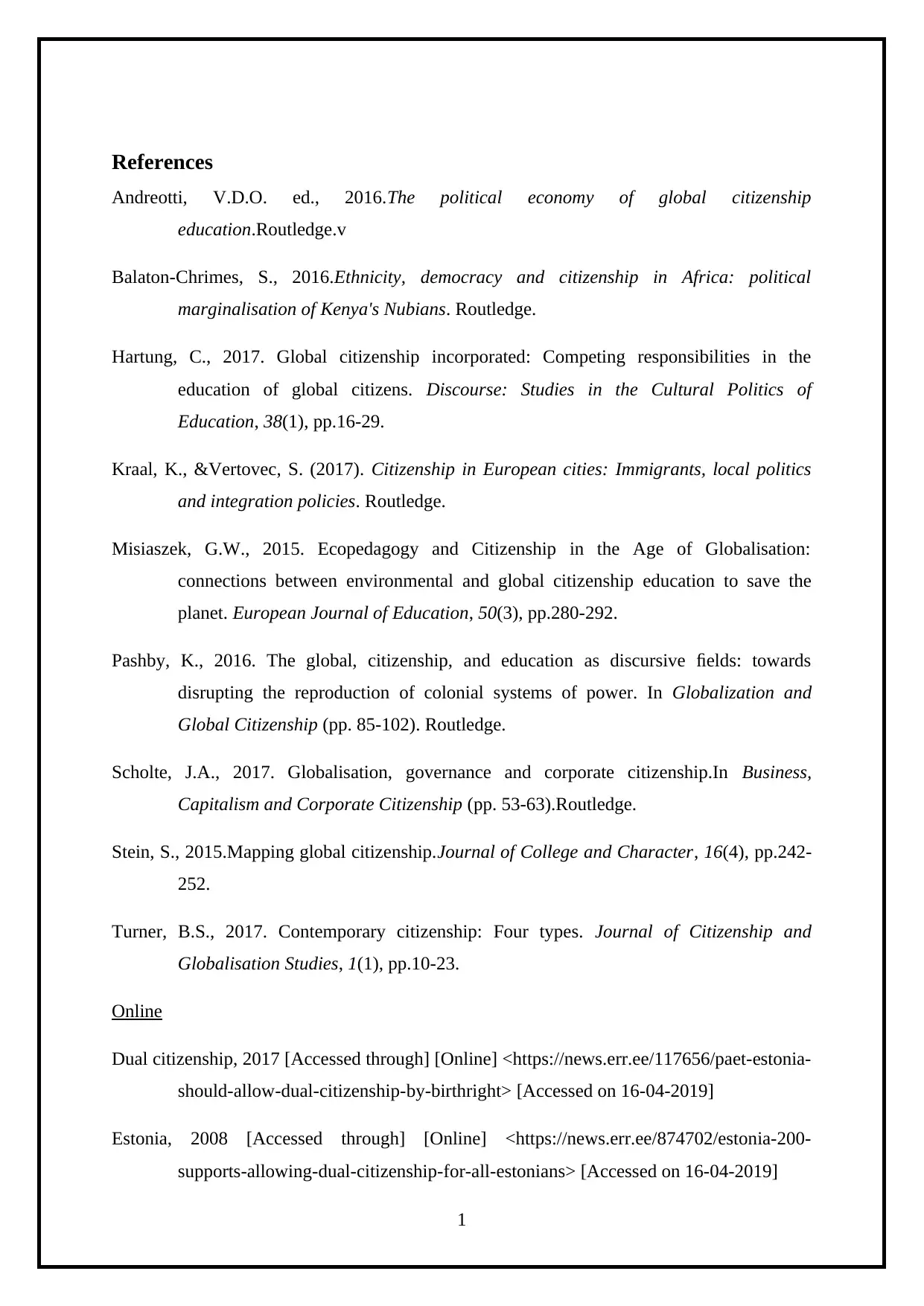
References
Andreotti, V.D.O. ed., 2016.The political economy of global citizenship
education.Routledge.v
Balaton-Chrimes, S., 2016.Ethnicity, democracy and citizenship in Africa: political
marginalisation of Kenya's Nubians. Routledge.
Hartung, C., 2017. Global citizenship incorporated: Competing responsibilities in the
education of global citizens. Discourse: Studies in the Cultural Politics of
Education, 38(1), pp.16-29.
Kraal, K., &Vertovec, S. (2017). Citizenship in European cities: Immigrants, local politics
and integration policies. Routledge.
Misiaszek, G.W., 2015. Ecopedagogy and Citizenship in the Age of Globalisation:
connections between environmental and global citizenship education to save the
planet. European Journal of Education, 50(3), pp.280-292.
Pashby, K., 2016. The global, citizenship, and education as discursive fields: towards
disrupting the reproduction of colonial systems of power. In Globalization and
Global Citizenship (pp. 85-102). Routledge.
Scholte, J.A., 2017. Globalisation, governance and corporate citizenship.In Business,
Capitalism and Corporate Citizenship (pp. 53-63).Routledge.
Stein, S., 2015.Mapping global citizenship.Journal of College and Character, 16(4), pp.242-
252.
Turner, B.S., 2017. Contemporary citizenship: Four types. Journal of Citizenship and
Globalisation Studies, 1(1), pp.10-23.
Online
Dual citizenship, 2017 [Accessed through] [Online] <https://news.err.ee/117656/paet-estonia-
should-allow-dual-citizenship-by-birthright> [Accessed on 16-04-2019]
Estonia, 2008 [Accessed through] [Online] <https://news.err.ee/874702/estonia-200-
supports-allowing-dual-citizenship-for-all-estonians> [Accessed on 16-04-2019]
1
Andreotti, V.D.O. ed., 2016.The political economy of global citizenship
education.Routledge.v
Balaton-Chrimes, S., 2016.Ethnicity, democracy and citizenship in Africa: political
marginalisation of Kenya's Nubians. Routledge.
Hartung, C., 2017. Global citizenship incorporated: Competing responsibilities in the
education of global citizens. Discourse: Studies in the Cultural Politics of
Education, 38(1), pp.16-29.
Kraal, K., &Vertovec, S. (2017). Citizenship in European cities: Immigrants, local politics
and integration policies. Routledge.
Misiaszek, G.W., 2015. Ecopedagogy and Citizenship in the Age of Globalisation:
connections between environmental and global citizenship education to save the
planet. European Journal of Education, 50(3), pp.280-292.
Pashby, K., 2016. The global, citizenship, and education as discursive fields: towards
disrupting the reproduction of colonial systems of power. In Globalization and
Global Citizenship (pp. 85-102). Routledge.
Scholte, J.A., 2017. Globalisation, governance and corporate citizenship.In Business,
Capitalism and Corporate Citizenship (pp. 53-63).Routledge.
Stein, S., 2015.Mapping global citizenship.Journal of College and Character, 16(4), pp.242-
252.
Turner, B.S., 2017. Contemporary citizenship: Four types. Journal of Citizenship and
Globalisation Studies, 1(1), pp.10-23.
Online
Dual citizenship, 2017 [Accessed through] [Online] <https://news.err.ee/117656/paet-estonia-
should-allow-dual-citizenship-by-birthright> [Accessed on 16-04-2019]
Estonia, 2008 [Accessed through] [Online] <https://news.err.ee/874702/estonia-200-
supports-allowing-dual-citizenship-for-all-estonians> [Accessed on 16-04-2019]
1
Paraphrase This Document
Need a fresh take? Get an instant paraphrase of this document with our AI Paraphraser
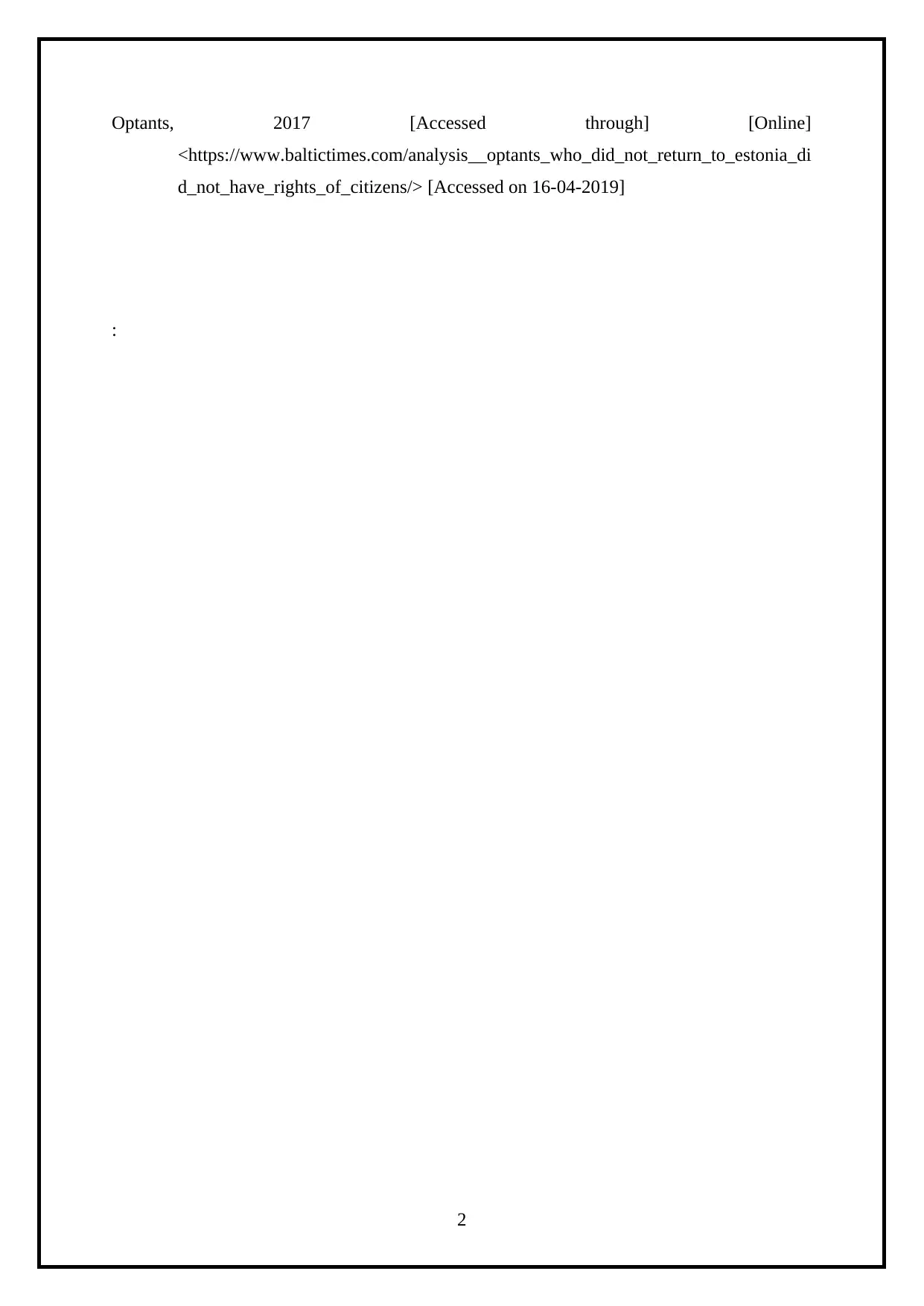
Optants, 2017 [Accessed through] [Online]
<https://www.baltictimes.com/analysis__optants_who_did_not_return_to_estonia_di
d_not_have_rights_of_citizens/> [Accessed on 16-04-2019]
:
2
<https://www.baltictimes.com/analysis__optants_who_did_not_return_to_estonia_di
d_not_have_rights_of_citizens/> [Accessed on 16-04-2019]
:
2
1 out of 8
Related Documents
Your All-in-One AI-Powered Toolkit for Academic Success.
+13062052269
info@desklib.com
Available 24*7 on WhatsApp / Email
![[object Object]](/_next/static/media/star-bottom.7253800d.svg)
Unlock your academic potential
Copyright © 2020–2026 A2Z Services. All Rights Reserved. Developed and managed by ZUCOL.





